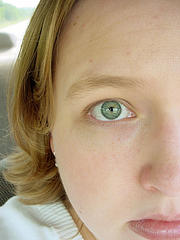
 “My name is Bob, I’m 53 years old and just recently diagnosed with a grade 4 GBM.”
“My name is Bob, I’m 53 years old and just recently diagnosed with a grade 4 GBM.”
“I was diagnosed yesterday,” says anne99, “still in shock. Usual things flying through my head why me, what have I done wrong.”
“Hi,” says mirrie, “I’m 40 years old and I was told last Thursday that I had breast cancer, and have spent the last weekend in a blur!”
It reads like the beginning of an Alcoholics Anonymous meeting. People of all ages standing up to say, “My name is so-and-so. It’s happened to me. Can anyone help?”
According to the MetLife survey, Americans fear cancer the most of any disease, so if you’re afraid, you’re not alone. First of all, take a deep breath. Now take three more. You just can’t deal with everything at the same time, so it’s best to start with the most important things first, then go from there. Breathe, take one step at a time, and follow these steps.
1. Take an emotional moment. Take a moment to cry, scream, sit dumbly in your big leather chair, suck on your favorite vanilla shake, whatever you need. But give yourself a limit. The first day. Then marshall the forces inside you and get busy. Don’t worry. You’re going to revisit your emotions often. It might be wise to buy a new journal for the task. But for now, limit it to one day. After that, you’ve got to get busy getting well.
2. Start thinking positively, now. Cancer is no longer the death sentence it used to be. More and more people are not only surviving, but thriving. Everyone’s case is different. You’re going to need all the good feelings you can muster, so start imagining yourself well right away. It may be the fight of your life, but you can come out of it stronger. If you don’t think so, start connecting with survivors all over the world. Lynn Lane has posted videos and stories of hundreds of survivors on his site, “Voices of Survivors.” Jonny Imerman of Imerman’s Angels can hook you up for free with one who went through the very same cancer as you have right now, and survived it. This can be an invaluable source of information for you. Contact him!
3. Educate yourself. If ever there was a time for you to become your best advocate, this is it. Research your type of cancer online, and start making a list of questions you want to ask your doctor, your nurse, your oncologist, and perhaps others on your team. Never be afraid to ask. Your doctor will have a plan of action for you, but the decisions are yours. Be sure to get a second opinion, and if necessary, a third. Don’t forget to ask about surgery, treatments (will you need chemotherapy or radiation?), specialists (which ones will you need?) and costs.
4. Get help. This is not a fight you want to do alone. Pick up the phone and contact your closest friend, whether it’s your spouse, sibling, mother, child, whomever is going to be the biggest source of strength and support to you through this journey. Better yet, surround yourself with positive, strong people willing to help you out. Ask your doctor about support groups in your area, and consider signing up for an online group like Cancer Compass or the Cancer Survivor’s Network.
5. Go over your insurance policy. Ask the hospital or cancer center in your area if they have a financial advisor, as he/she could be a big help. You need to know what your insurance policy covers, what it doesn’t cover, and what costs may be left up to you. Start keeping track of all your trips to the hospital or to the doctor, meals, and travel expenses, as these will all be tax-deductible. Enlist a friend of family member to help you manage all the bills, forms, and expense receipts.
6. Consider alternative healthcare. Many cancer centers today offer massage, Reiki, acupuncture, nutrition counseling, and other types of alternative healthcare within their facilities. If you don’t have ready access to these, start checking around your community for massage therapists, naturopaths, dieticians, yoga practitioners, and more who can help you stay strong through this process, especially if you’re going to take chemotherapy or radiation.
7. Tell yourself you can do it. You can do this. You can make it. Lots of people have. You can, too! Stay strong. We’re here to support you!
Do you have advice on how to make it through the first few days after a cancer diagnosis? Please share your experience.
Photo courtesy of strph via Flickr.com.

